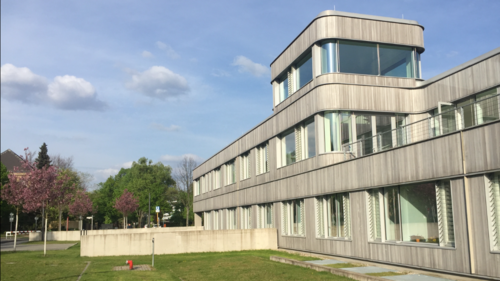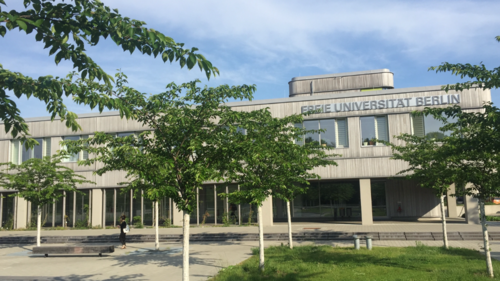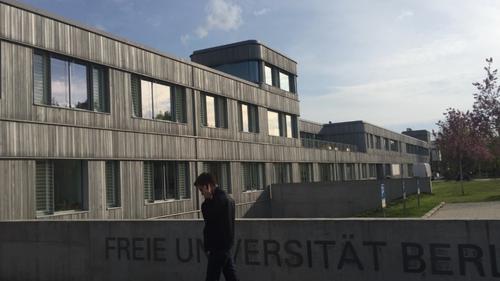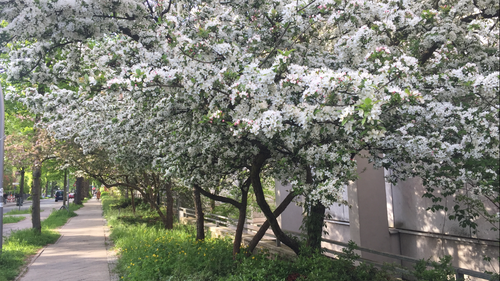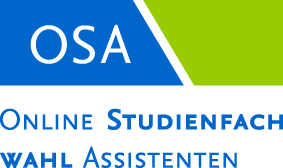Portrait of the Insitute for Jewish Studies
"Holzlaube", Fabeckstraße 23-25, Berlin
Image Credit: Elena Medvedev
"Holzlaube", Hofseite, Fabeckstraße 23-25, Berlin
Image Credit: Elena Medvedev
Holzlaube im Sonnenunterganglicht
Image Credit: Elena Medvedev
Uni-Weg; Berlin - Dahlemdorf
Image Credit: Elena Medvedev
Institute for Jewish Studies
The Institute for Jewish Studies, first of its kind at its founding, has been part of the Freie Universität for over fifty years. It is no coincidence that the Free University, founded in 1948, was to become a pionneering institution for Jewish Studies. The decision to found the Berlin Institute for Jewish Studies followed the appeal hearing of Jacob Taubes (previously at Columbia University in New York) in 1963. It is therefore the oldest site for judaistic teaching and research among German universities.
During the spring semester of 1952, lectures on Jewish History and Literature were already given by Adolf L. Leschnitzer, who had studied and worked in Berlin before his forced migration. His lectures focused on Jewish-German relationships and antisemitism. This scope was soon broadened as Leschnitzer was joined by Ernst L. Ehrlich, Hermann L. Goldschmidt, Johann Maier and Jacob Taubes.
The philosopher and hermeneutic Jacob Taubes, who passed away in 1987, was director of the Institute for Jewish Studies until 1979, when he accepted a new position as director of the Institute of Hermeneutics.
Historian Marianne Awerbuch led the Institute from 1979 until her retirement in 1983.
Awerbuch was succeeded by Peter Schäfer (who had previously held a professorship at the Martin-Buber Institute for Jewish Studies at the University of Cologne). Schäfer oversaw a complete restructuring of the Institute and the study program. His changes made it possible to add a second professorship in 1987, which was held by Michael Brocke (previously Professor for Jewish Studies at the Universität GH Duisburg) from 1988 to fall of 1996.
In 1993, Joseph Dan, scholar of Gershom Scholem and professor for Kabbalah at the Hebrew University of Jerusalem, became a constant guest professor. Until 2002, Professor Dan divided his teaching and research projects between Jerusalem and Berlin.
Michael Brocke returned to the University GH Duisburg for the fall semester of 1996/97. At the turn of the year 1997/98, Peter Schäfer accepted a professorship at Princeton University. Until 2003, Professor Schäfer spent time teaching and researching in both Berlin and Princeton.
Giulio Busi took up the second C4 chair at the Institute of Jewish Studies in 1999 and was executive director of the institute from 2004 to 2024. He had previously taught Hebrew language and literature and Jewish history at the University of Venice.
After ten years of teaching at the Freie Universität, professor Joseph Dan retired in 2002. Due to economic circumatsances, this professorship could not be renewed.
Between 2003 and 2008, Peter Schäfer taught exclusively at Princeton, retired in 2008 and was appointed director of the Jewish Museum of Berlin in 2014.
Leaving her position as a lecturer at the Hebrew University of Jerusalem, Tal Ilan accepted a C3 professorship for Early Judaism in October 2003.
Lukas Mühlethaler taught at the Institute for Jewish Studies as junior professor from 2013 to 2019, and has been professor for Jewish Philosphy since.
Silvana Greco taught at the Institute for Jewish Studies as an adjunct professor from 2013 to 2023. In 2023, she was appointed honorary professor of Sociology of Judaism.
Since August 2024, Reimund Leicht has been director of the Institute and professor for Jewish Studies with a focus on History, Religious History and Philosophy of Judaism.
